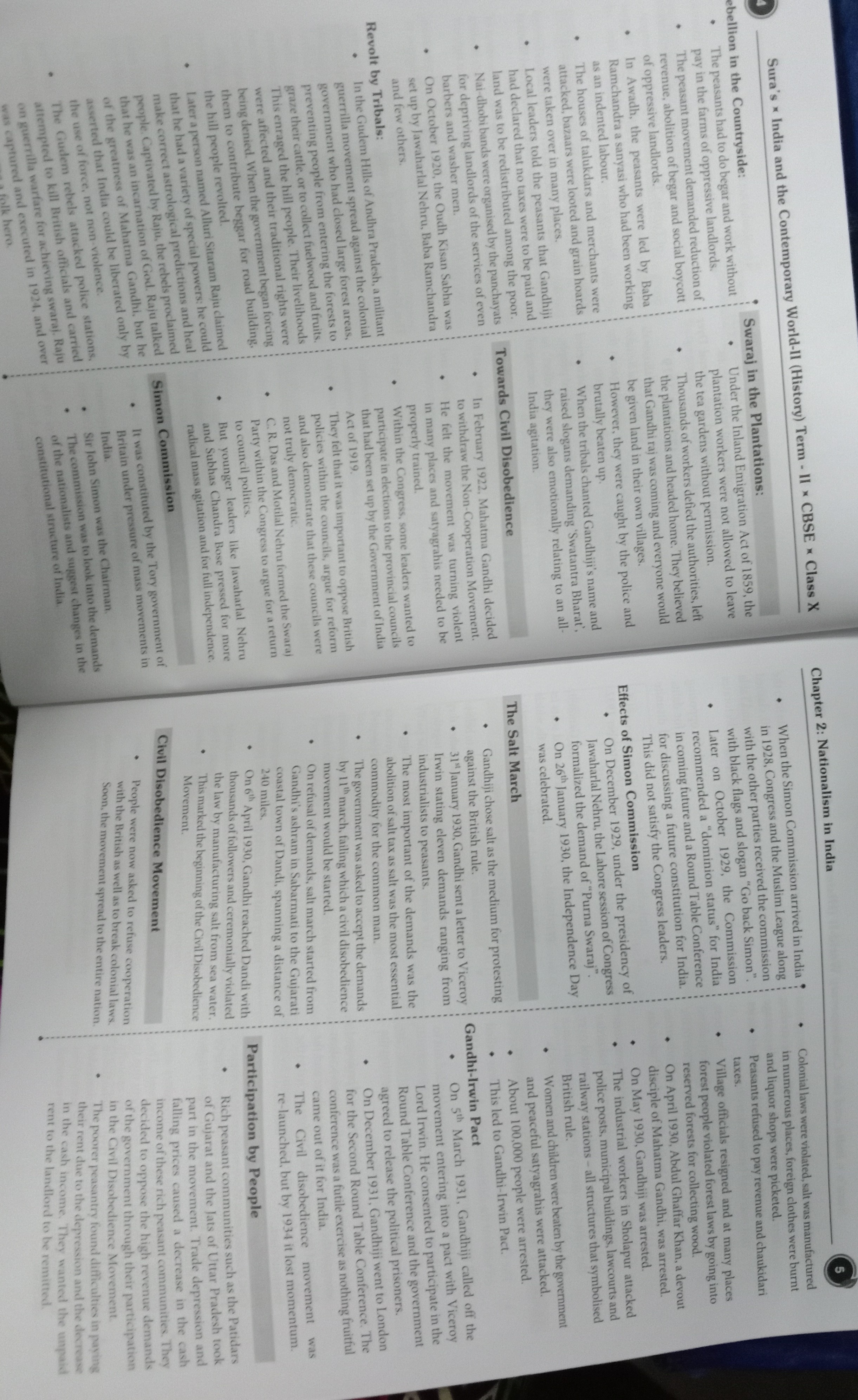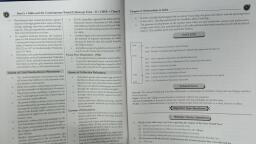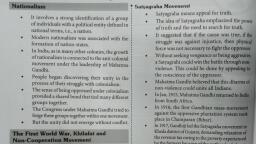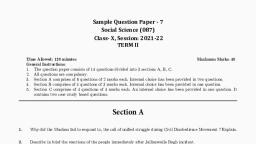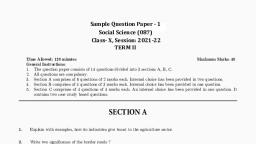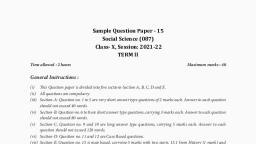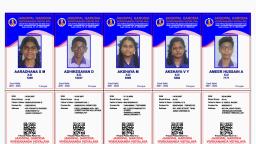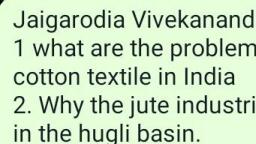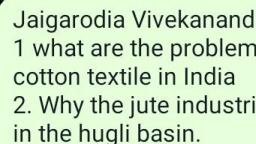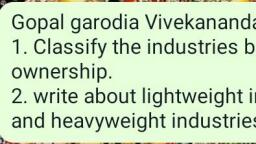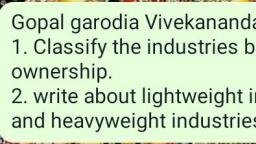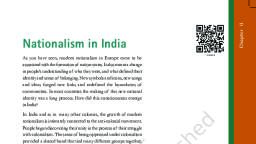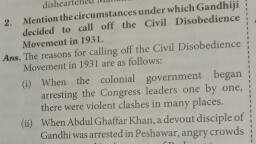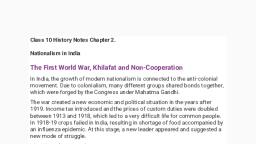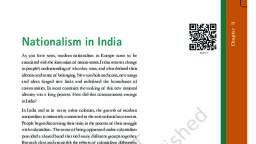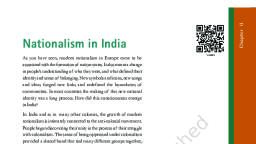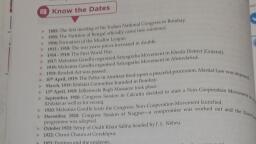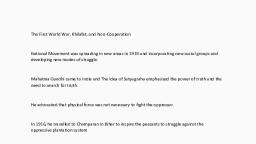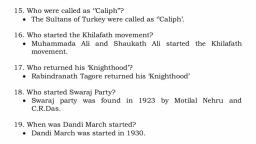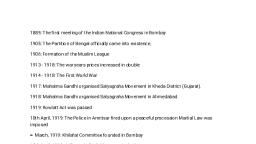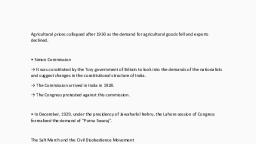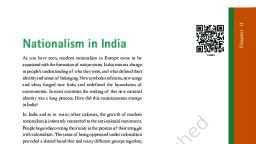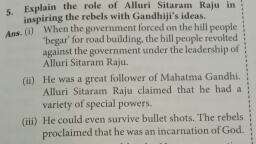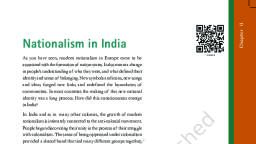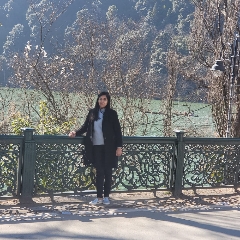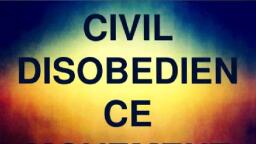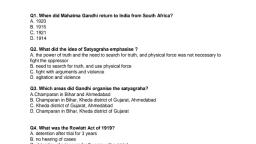Page 1 :
ebellion in th, , Re, , , , , , Sura’s * India, , , , , , , , c, , fot, , , , On 4, set, , and f, , rbe, , , , }, , ihom &, , depriving \, , rms and, , yctobe!, , cw oth, , volt by Tribals:, »Gudem Hills of Andhra Pradesh, a militant, {lla movement spread against the colonial, , e, , In the, quert, , govern my, preventing, , , , ent who had closed large, people from entering the forests to, , and the, , e Countryside:, , , , , , , , led by, , were, , , , tars and merchants were, , yaars were looted and grain hoards, , , , . redistributed among the, , , , ds were, , , , washer men., , 1920, the, , ers., , Contempor, , , , whon ¢, , | boycott, , yeen work, , peasants that Gandhiji, , » taxes were to be paid and, , organised by the panchayats, , e, , , , , , Baba |, , , , ‘, , ;, ', , poor., , yndlords of the services of even, , Oudh Kisan Sabha was, up by Jawaharlal Nehru, Baba Ramchandra, , forest areas,, , graze theit cattle, or to collect fuelwood and fruits., , This ent , : s, were affected and their traditional rights were, When the government began foram, , denied., , , , the hill people., , Their livelihood, , for road building., , Atluet Sitaram Raya claimed, , rs; he could, jetions and heal, , ne rebels prociaimed, , «, ', :, :, ¥, ', t, ', ', :, ‘, :, ', ‘, , ary World-ll (History) Term , Swaraj in the Plantations:, , 1, ', ', ', 1, ‘, ', :, ', ’, :, \, , ', ‘, t, ', ’, ', ', ', ', 1, ', :, ', , ', ', ‘, ', ', ‘, i, ', , :, ’, :, ‘, ', :, ., :, ‘, ‘, ‘, ', ‘, :, ‘, ', in, ', , t, ', , ', ', t, ', , , , , , \\ x CBSE « Class X, , stot, , Act of 1859, the, plantation W orkers were not allowed to leave, , , , , , , , » Under the Inland Emigration, the tea gardens without permission., , . Thousands of workers defied the authorities, left, the plantations and headed home, They believed, that Gandhi raj was coming and everyone would, be given land in their own villages., , « However, they were caught by the, brutally beaten up, , police and, , e Whenthetr ibals chanted Gandhiji’s name and, raised slogans demanding ‘Swatantra Bharat,, , they were also emotionally relating to an allIndia agitation, Towards Civil Disobedience, . In February 1922, Mahatma Gandhi decided, , to withdraw the Non-¢ ooperation Movement., , . He felt the movement violent, , in many places and satyagrahis needed to be, properly trained, , was turning, , * Within the Congress leaders W anted to, , participate in elections to the provincial couns ils, that had been set up by the Government ol India, Act of 1919, , some, , . They felt that it was important to oppose British, , policies within the councils, , argue for relorm, , and also demonstrate that these councils were, not truly democratts, , ° c.R. Das and Motilal Nehru formed the Swara), darty within the Congress to argue for a return, , art) ‘ ‘, , to cOUNnK il politic s, , <u ee younger leaders like Jawaharlal Nehru, and Subhas Chandra Bose pressed for more, , radical mass agitation and for full independence e., , , , , , , , , , Chapter, , , , 2: Nationalism in India, , When the Simon Commission arrived in India, , in 1928, Congress and the Muslim League along, , with the other parties received the commissio, , with black flags and slogan “Go back Simon”., Later on October 1929, the, recommended a, for discussing 4 future, , This did not satisfy the Congress leaders., , , , , , , , , Commission, “dominion status” for India, in coming future anda Round Table Conference, ; constitution for India., , ®, \ in numerous places, foreign clothes were burnt, , , , ‘ + Village officials resigned and a many places, , ‘ forest people violated forest laws by going into, , ‘ reserved forests for collecting wood., , ‘ «On April 1930, Abdul Ghaffar Khan, a devout, , , , , , , , , , Effects of Simon Commission ; disciple of Mahatma Gandhi, was arrested., ' ~ say, » On December 1929, under the presidency of | e On May 1930, Gandhiji was arrested., : 7 t ‘ * i, Jawaharlal Nehru, the Lahore session of Congress «The industrial workers in Sholapur attacked, formalized the demand of "Purna Swaraj”. police posts. municipal buildings, lawcourts and, » On 26" January 1930, the Independence Day ‘ railway stations ~ all structures that symbolised, ‘ J ' sa, was celebrated. i British rule., ' ¥ ¥, ‘ « Women and children were beaten by the government, The Salt March \ and peaceful satyagrahis were attacked., :, : : : . About 100,000 peo le were arrested., + Gandhiji chose salt as the medium for protesting ‘ : - we . . — » 2, against the British ula. ' . This led to Gandhi-Irwin Pact., st . ‘ ‘, ¢ — 31January 1930, Gandhi senta Jetter to Viceroy | Gandhi-Irwin Pact, - - ,, pin stating eleven demands ranging from | « On 5% March 1931, Gandhi called off the, industrialists nalts ' os ee , Fin, ; - istrialists to peasants, : movement entering Into 4 pact with Viceroy, ye MO! . : a, oil Ost a of the demands was the | Lord Irwin. He consented to participate in the, abolition of salt tax as s ; ¥ ‘ wr ., scala . = Ut 2 as salt was the most essential | Round Table Conterence and the government, odity for the c¢ ‘, ° Thegnvenr e common man ‘ agreed to release the political prisoners:, vernment was aske a ‘ ;, by 1 march, fail se co acceptthe demands + . On December 1931, Gandhiji went to London, : . , fang which @ % ; . ., movement would os t si “ha disobedience | for the Second Round Table ¢ onference The, ¢ Startled, ‘ ‘, + On vefonal 6fdemand : conference was a futile exercise 2 nothing fruitful, Gandhi's ashr “eet march started from | came out of it for India., hs dabarmati t . : ‘ coastal town of Dandi, spann : - Superet | - The Civil disobedience movernent was, 240 miles. Snes Since of | re-launched, but by 1934 1 lost momentum, * On6a ‘, April 1930, Gandl ;, . d Li rea h . ) ’, ment tollowers and cer : es a ee Participation by People, the law by . emonially violated ;, : Y manutacturing ated | ee, : This marked the beginn g salt er sea water. | . Rich peasant ¢ OMMUMUNTES SUC has the Patidars, Movement. Binning of the Civil Disobedience of Gujarat and the Jats of Uttat Pradesh took, movement. | rade depression and, } srices caused a decrease Mm the cash, * — Peoph : hese rich pe :, ie were i ' ¢ nich peasant OMNITURE, with th now asked to refuse co : ided to oppose th : re, . ¢ British as well ast - cooperation | of ppose the high, Soon, the me Sto break colonial | : 1 government t, vement spread to the aw | in the Ciwil D, entire nation. | a ivil Disobedien, , , , The poorer, , , , their Ce
